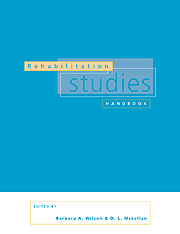Book contents
- Frontmatter
- Contents
- List of contributors
- 1 Introduction to rehabilitation
- 2 Disabled people in society
- 3 Disability equality training
- 4 Towards a therapeutic alliance model of rehabilitation
- 5 Rehabilitation education: a learner-centred approach
- 6 Work, occupation and disability
- 7 Management in rehabilitation
- 8 Research and evaluation in rehabilitation
- 9 Statistical methods
- 10 Social policy, disability and rehabilitation
- 11 Principles of the acquisition of sensorimotor skills
- 12 Management of acquired cognitive disorders
- 13 Challenging behaviour: helping people with severe brain damage
- 14 Pain
- 15 The multiply handicapped child
- 16 The transition to adult life
- 17 Factors specific to disabled elderly people
- Index
12 - Management of acquired cognitive disorders
Published online by Cambridge University Press: 06 November 2009
- Frontmatter
- Contents
- List of contributors
- 1 Introduction to rehabilitation
- 2 Disabled people in society
- 3 Disability equality training
- 4 Towards a therapeutic alliance model of rehabilitation
- 5 Rehabilitation education: a learner-centred approach
- 6 Work, occupation and disability
- 7 Management in rehabilitation
- 8 Research and evaluation in rehabilitation
- 9 Statistical methods
- 10 Social policy, disability and rehabilitation
- 11 Principles of the acquisition of sensorimotor skills
- 12 Management of acquired cognitive disorders
- 13 Challenging behaviour: helping people with severe brain damage
- 14 Pain
- 15 The multiply handicapped child
- 16 The transition to adult life
- 17 Factors specific to disabled elderly people
- Index
Summary
What is cognition?
Cognition refers to processes involved in knowing, understanding, learning, perceiving, remembering, judging and thinking. These can be contrasted with physical, behavioural or emotional processes although it is not always easy to separate them, particularly when they may in some circumstances interact with each other. Judging whether a person is exercising a cognitive or some other process, simply by observing behaviour, is not at all easy. For example, memory-impaired people who keep repeating the same question may be doing so because of anxiety (an emotional problem), or because they have forgotten they have already asked the question (a cognitive problem), or because they see that it is annoying for those around them and find this rewarding (a behavioural problem).
It is not easy to see beyond the physical manifestations of problems in order to recognise underlying cognitive failures. Consider, for example, apraxia which is a disorder of movement not resulting from paralysis, weakness or a failure to understand what is required. Hence a patient with apraxia may be unable to carry out a movement or a sequence of movements despite having the necessary strength and range of motion to do so. The failure is in fact at the level of organising, planning or sequencing of movements, and to determine whether someone has apraxia it is necessary to exclude paralysis, weakness and poor comprehension as explanations. An accurate diagnosis is made even more complicated in the case of brain-injured people who may have all of these processes impaired in combination with the apraxia.
Even when we are clear that a patient has a cognitive problem it may require further investigation to determine its exact nature.
- Type
- Chapter
- Information
- Rehabilitation Studies Handbook , pp. 243 - 262Publisher: Cambridge University PressPrint publication year: 1997
- 1
- Cited by



